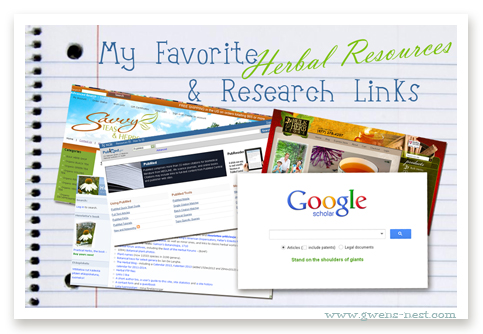
My favorite herbal remedy research sites run the gamut from scientific sites that are chock full of studies, to more rustic blogs by folk herbalists who write about one herb at a time.
As you may be able to tell, I really enjoy researching herbs and natural healing, and I often share the results of my efforts here. But there are so many topics and herbs that I haven’t covered yet.
So I thought it would be worthwhile to talk about good research techniques, and post my favorite herbal remedy research sites. This is something I talked about recently at a “Herbs for Beginners” class, and I promised them that I’d share the resource links here on my blog. This is worth bookmarking just for the links below!
The field of herbs and natural healing is very wide ranging. From acupuncture to essential oils…and then there are tons and tons of “junk” websites, just repeating old wives tales or giving very vague ‘information’ that is not practical or usable, or worse…they are just trying to sell their products. I skip sales sites, as their information is offered with bias toward their product. So, how do you find the “good stuff” on the web, without getting sidetracked with a bajillion junk sites? I’ll show you what works for me.
My Herbal Research Journey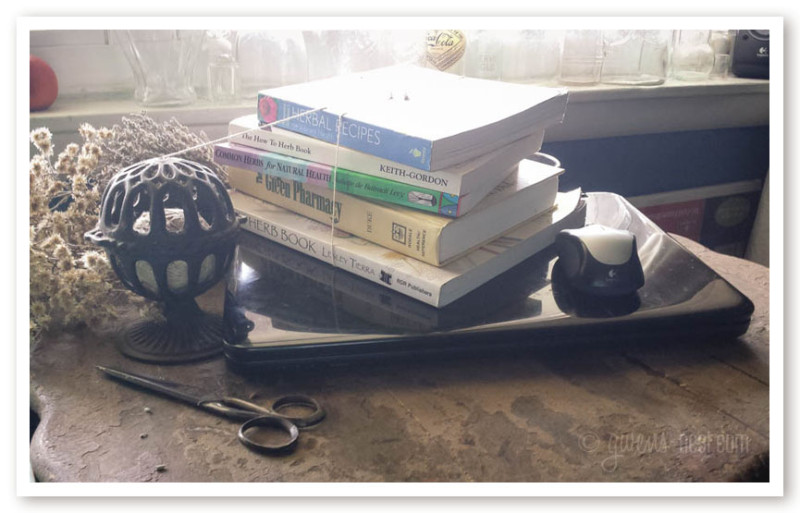
When I began my journey into researching herbs, I made a list of situations and common household illnesses that I wanted to learn how to treat at home if possible. Ear infections, pink eye, stomach bug, etc. I spent time just researching how to handle each one, and asking friends who were more knowledgeable than I what they did (a good forum is a great place to learn!)
I kept a file of notes on each illness, and continued to add to my list of ailments and even first aid treatments to research “just in case”, so I’d be prepared if a burn happened, or if one of my little ones awoke to the awful gasping of a croup cough. I’ve used and shared this information so many times over, and have never regretted those hours of research. Check out the “Home Remedy Cheat Sheet” I posted for our common household injuries and illnesses.
Here is a brief outline of how I handled the research for Whooping Cough, when I realized that my kids had it:
How I Researched Whooping Cough
Often, I will start my research with a symptom or disease state in mind. I’ll start out “fishing” with some general search terms like: “whooping cough remedies”, “pertussis natural remedies”, or the like. I’m really looking for good search terms, mainly. Is there a common name and an “official” name for a disease?
If I want to dig into the specifics of how the disease progresses, I will search Google books or Google Scholar for something like “pathology of Whooping Cough”, and look for medical journals or textbooks that give me more information.
You can see below, the results of a Google Scholar search for just the word “garlic”
 “Pathology” means the science behind or typical progression of a disease. Using scientific lingo…words like pathology or “Pertussis” over the more common term “Whooping Cough”, will often land you on higher quality search pages. Often times, I have to use a glossary or even search “define virulence” to really understand the language used in the passages or studies, but the knowledge I gain from it is really invaluable! Several things to look for: does the disease have stages? Can you identify which stage you’re in? Exactly what tissues are affected? How long is the person contagious?
“Pathology” means the science behind or typical progression of a disease. Using scientific lingo…words like pathology or “Pertussis” over the more common term “Whooping Cough”, will often land you on higher quality search pages. Often times, I have to use a glossary or even search “define virulence” to really understand the language used in the passages or studies, but the knowledge I gain from it is really invaluable! Several things to look for: does the disease have stages? Can you identify which stage you’re in? Exactly what tissues are affected? How long is the person contagious?
Now I will often move to antique medical journals, that cover what herbs were used for these conditions prior to “modern medicine”. Even though these doctors didn’t have the same technology and possibly didn’t understand the pathology of the disease, the herbs they used were based on the fact that they were effective against that specific problem. Again, you’ll probably need to break out your medical glossary. Keep your eyes peeled for specific herbs and the preparation methods.
As I go, I am copy/pasting notes or ideas (in ‘normal English’) to help me formulate a plan. My real search is not just for understanding, but for a practical way to treat using foods, therapies, and herbs that are available to me. Which leads me to mention that the best time to research like this is prior to being in a stressed place of immediate need. However, I have never been so motivated as the times when my little people need immediate care.
Researching Nourishing Foods
The other area that I will research is in the arena of foods that are nourishing to the tissues or systems that are damaged by the disease. In my whooping cough research, I Googled “herbs mucosal lining” or “strengthen epithelial cells” to discover that beta carotene is a good candidate…and then search “foods beta carotene” or “high levels of beta carotene” to discover foods or herbs that will deliver what is needed. I repeated this for each tissue or area of damage, and formulated a good collection of foods to help my little man heal faster. (See Whooping Cough Stew recipe)
Herbal Monographs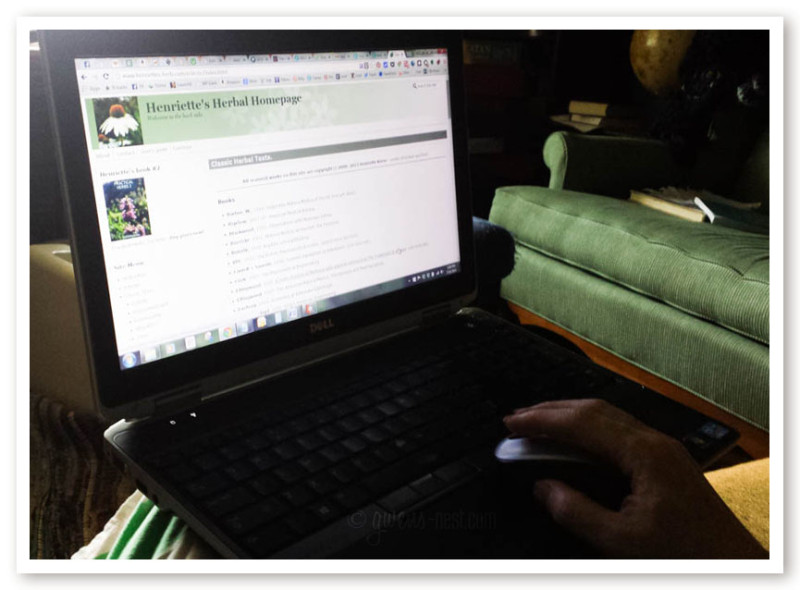
If a particular herbal remedy or herb stand out, and I have ready access to them, I love to read how other herbalists are preparing and using them. I’ve noted some favorite herbalists below in the resources.
I also really love to just focus in on one herb…one that I have easy access to, and am just getting to know, and I’ll just study to increase my knowledge about that one herb, seeing how many ways I can use it. An article focusing on the action and uses of one herb is called a “monograph”.
I once read that the difference between a good herbalist and a great herbalist is that a good herbalist can name 5 different herbs for one condition. A great herbalist can name 5 different uses for one herb. It’s a good idea to get to know a few local or available herbs…my favorites herbs are remedies that you probably already have in your kitchen that I write about here at Gwens-Nest.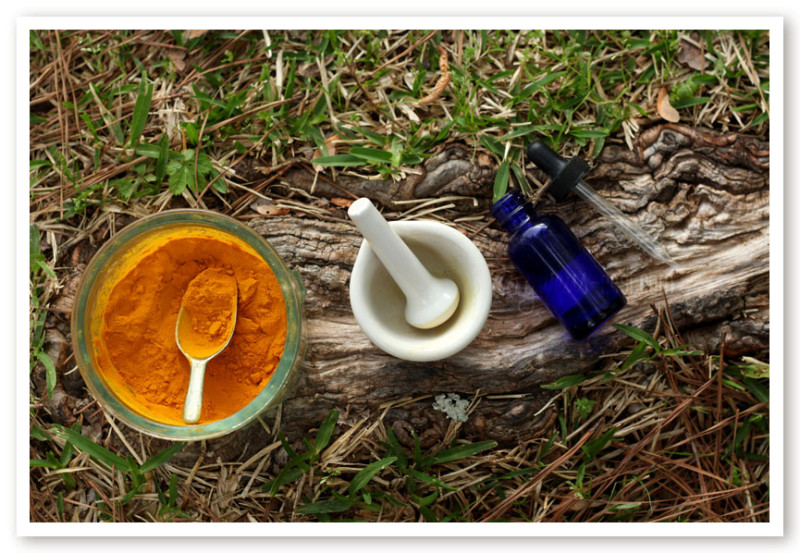
Constitu-whats?
It’s always fun to see studies on herbs! But the herbs are rarely referred to by name…the studies are almost always done *just* on one ingredient from an herb. To find out more about the herb you’re studying, Google “constituents of ______”. The term “constituents” is essentially referring to the ingredients of the herb, and the “active constituents” is more than likely what is going to be studied.
For instance, turmeric is not listed in a research database, but “curcumin”, the active constituent of turmeric has lots of hits. A few others active constituents include:
- garlic=allicin
- onion/onion skins=quercetin
- sweet gum balls or star anise= shikimic acid (Tamiflu);
The drug companies will fund studies on these to look for patentable ($$$) ways to extract them and use them as medications. Once you find the active constituent, search the study database link below to learn more about the powerful properties and actions of that herb! Or conversely, use the constituent to find *other* herbs that may be more accessible to you, and you can research those to see if they have similar actions and history of use.
Keep in mind that in general, the whole herb is often a wiser, gentler way to treat. A whole herb contains many other compounds that can often counteract harsh or the negative side effects that show up in studies…always do more research on drug and herb interactions and side effects.
Another consideration is that often these constituents are given in massive doses in studies to establish “toxicity”…and the side effects can be scary. Just keep in mind, when using a whole herb, it’s rare that you’d get anywhere near that amount of one ingredient using the actual herb. This is where the antique medical journals come in handy…they will often list dosage amounts, and will give you a good idea of the history of use.
Contraindicated: Not for Pregnant or Nursing Women?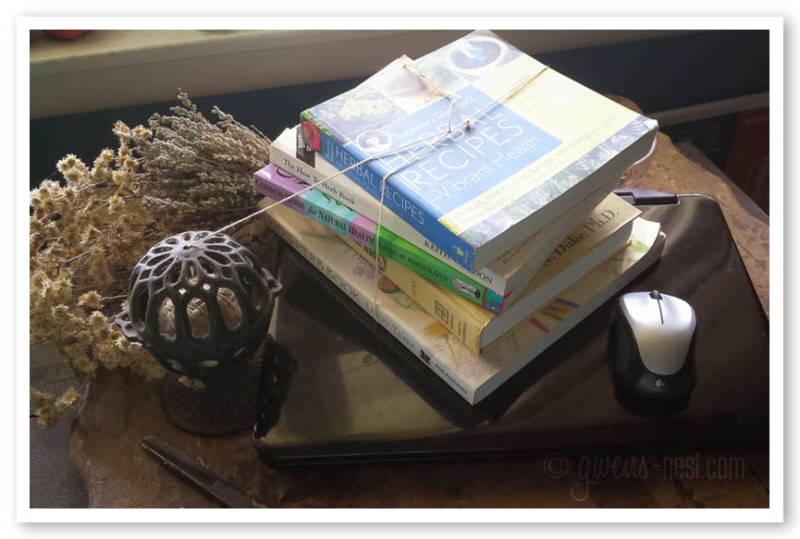
If you’re finding that the USDA has labeled an herb “contraindicated” for pregnant or nursing mother’s, it’s helpful to know that the USDA doesn’t actually test herbs, and that label is standard protocol if an herb has not undergone any testing with pregnant/nursing women through outside sources/funding.
I found it really helpful to look up the German Commission E monographs or report on that herb. The Commission E is roughly the European equivalent of the USDA, and they do actually test herbs alongside pharmaceutical drugs. Their literature may give you much more information, and oftentimes let you know whether or not the herb has a history of use by pregnant and nursing mothers.
I do recommend running any herbs, supplements or treatments by your midwife or doctor prior to taking it. Print out any relevant information to take along to your appointment if your doctor is not highly knowledgeable about natural remedies and herbs.
Hope this is a help to you! Now, here are some of my favorite herb research sites:
Science/Medical Herb Research Sites
All of the following links will open in a new window.
- NCBI/Pubmed: database of published studies with summaries.
Note: A vast majority of studies are funded to look at single “constituents” or ingredients from an herb (in the hope of patenting a medication). It’s helpful to research “active constituent of…”for your herb, and then use the key constituents in searches to find the studies. Often, a single constituent of an herb will present with toxicity or have side effects that the use of the full herb will not…be sure to look at other data on the whole herb and its history of use as well.
- Europe PubMed.Org: European database of studies, abstracts, etc.
- books.Google
Search online books by topic (MANY medical textbooks here that are very helpful with identifying pathology.)
- Scholar.Google: go right to the educational and scientific articles…and expect big words.
- Sloan Ketterling Cancer Research: About Herbs
Note: this site contains lots of helpful herbal “monographs” or articles that look at a single herb, with references to many of the studies, current medical uses, interactions, and warnings.
Herbalists
This is where you’ll find herbal monographs, excellent articles on herb theory and more…
- Herbcraft Master Herbalist Article Index: The best links to articles, sorted by multiple topics from the best herbalists out there.
- Herbal Search: This custom Google Search was set up by Henrietta Kress in 2006, and links to the sites of herbalist Paul Bergner. It’s a great resource, as you can type in “PCOS” or “sore throat” and it will only bring up very high quality search results from an herbal perspective. Use this Custom Herbal Google Search.
- Dr. Jim Duke maintains an amazing free resource that allows you to search by plant, phytochemical, etc. Search his herb database here.
- Henrietta Kress: At HenriettasHerbal.com Amazing resource for learning about herbs…from photos, to articles, to antique apothecary books. You may have to register at her site to have access to these resources. I have her newest book, and it’s really well done.
- Mathew Wood: good, solid approach to using herbs. His website contains some great articles on the philosophy of Western Herbalism.
- Jim McDonald: Jim is an herbalist, teacher, and author. He’s based in Michigan, and his site has lots of really good monographs, along with some great articles on the properties and methodology of herbalism, recipes, and more.
http://www.herbcraft.org/seedsstems.html
- Darryl Patton: the Southernherbalist.com He’s got a good grasp of the practice of herbalism in the southeast United States. He’s from Alabama, and has videos and articles about local herbs, and how to use and find them. His approach is a great blend of folklore and science based herbalism. Darryl is also on YouTube.
- Phyllis Light: Phyllis is a 4th generation herbalist in the southeast United States, and has deep roots in the Appalachian herbal traditions passed on my her Creek/Cherokee Grandmother. Phyllis is an author, teacher, and speaker, as well as a practitioner. She’s written a lot of great articles here on her website, including a series on making and using teas and decoctions. Phyllis D. Light: Herbal Studies and the Appalachian Center for Herbal Health
- BearMedicineHerbals: Kiva Rose This girl knows her herbs. Fantastic monographs and lots of info especially for herbs found in the desert areas of the western US…she’s in New Mexico.
Good article describing Tissue States (ideas like hot, cold, wet, dry, etc.):
- Susun Weed: Susun is a colorful herbalist who brings a slightly different perspective to the table. Instead of focusing on the illness-matched-to-herb mentality, she has focused her learning on using herbs in a more gentle way for daily nutrition. Susun is very knowledgeable about herbs for women and pregnancy. She’s a hoot, and has lots of YouTube videos.Her concept of using Nourishing Herbal Infusions and Vinegar infusions is really worth watching.
Antique/Classical herbal texts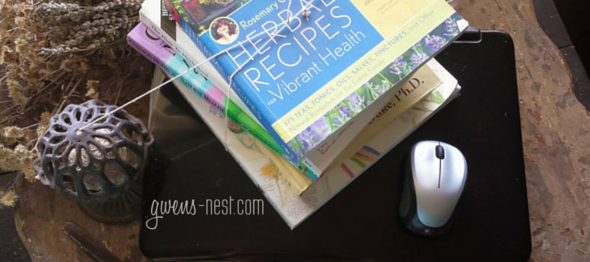
- HUGE Collection of Classical Herbal Texts from Henrietta’s site: ranging from the early 1700’s through 1943. The fantastic thing is that her site includes a good search tool that covers all of these texts. You may have to join her site to use this feature, but it’s well worth it. (She doesn’t send spam).
Note: these old herbal medical reference books sometimes use very antiquated language, but they are invaluable for discovering broad range of historical uses and preparations from herbs. I used this source heavily in my research for the elderberry articles.
- Awesome Glossary of Weird Herbal/Medical Terms: If you’d like a quick reference for the odd terms, like “Diaphoretic” and “Vermifuge”, check out this link of primary and secondary herbal actions by Jim McDonald. The glossary starts about 1/3 of the way down:
- Bulk Herb Store.com is a really great research site, because they quote several great herb books on each herb page. It’s my exception to the rule of not using sales sights to research…this is a good one! Just use their site search feature, using an herb name or even a condition, like “high blood pressure”, and it’ll pull up the articles and herbs that correspond.
How To Resources:
- One of my favorite resources for preparing herbs is the e-book that is *free* when you sign up for the newsletter from Savvy Teas & Herbs.
She covers all the basic ways to prepare and dose herbs…VERY worth downloading and printing!
- Mountain Rose Herbs YouTube Channel: lots of great how-to’s and recipes: how to make an infusion, how to make an extract, etc.
- Bulk Herb Store.com How To: Basic, written instructions on how to make herbal infusions, glycerites, etc.
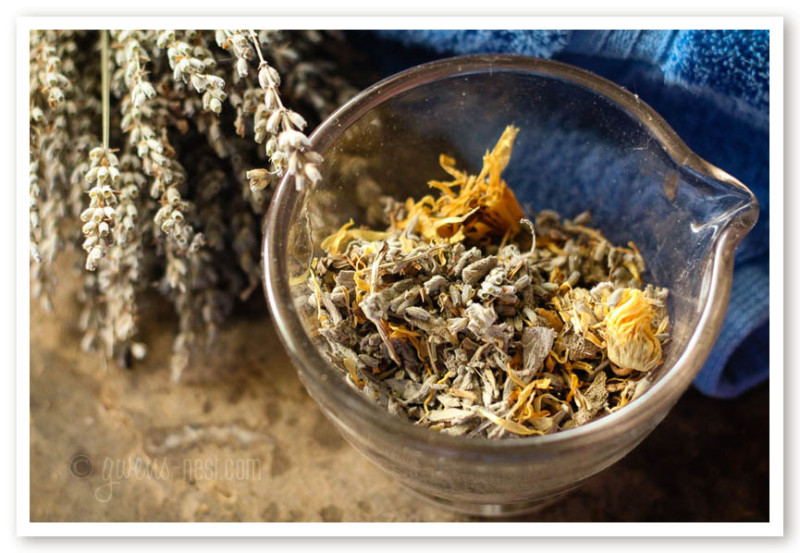
Herb Resources: Where to Get the Herbs
Some of the following links are affiliate link. Sales from these links help support my site, but you pay the prices you’d normally pay.
- The side of the road, or from my own herb garden…my favorites! 🙂 (Be sure that your roadside finds are from areas NOT sprayed with pesticides)
- Amazon.com– My Amazon bulk her store is full of great picks!
- Savvy Teas & Herbs http://www.savvyteasandherbs.com/ fantastic tea blends, and nice quality herbs.
- Mountain Rose Herbs http://www.mountainroseherbs.com/ great selection of herbs, including organics and a good selection of tools/bottles/accessories. (This is my affiliate link)
- San Francisco Herbs http://www.sfherb.com/ good overall selection, and they have a great price on sea salt.
- Bulk Herb Store http://www.bulkherbstore.com/ good herbal blends, and a good selection of herbs, articles, and how-tos.
Honorable Mentions:
- Karen Hurd
Karen is a nutritionist, and I’ve found her articles on gall bladder disease and morning sickness to be VERY helpful in understanding the way that the liver and gall bladder systems work. Highly recommend! I’ve known 3 people who have avoided gall bladder surgery with her recommendations.Karen’s articles on diabetes, recipes, and diet allowed another friend to maintain normal blood sugar levels during gestational diabetes , with no insulin supplementation…something even her Dr. and a nutritionist had not been able to accomplish. (Read about it on her blog, here…start at the bottom of the page for her first posts on Gestational Diabetes.)
The article on morning sickness is eye opening as well!
The whole list of Karen’s articles
Gall Bladder
And Finally…My VERY Favorite Way to Learn About Herbs:
Like regional cooking is passed down from mother to daughter, the use of herbs is often passed down verbally from one generation to another. This is actually my very favorite way to learn about herbs…from those who actually use them. Which is why I started writing about my experiences here…hopefully one day my kids can use the things I write here as a reference.
If you’re lucky enough to have any relatives that can share your family’s natural remedies from the past, don’t forget about this invaluable resource!
In fact, a friend just mentioned her favorite way to learn about herbs, and I thought I’d share it here too:
” …honestly there is nothing to compare with simply using the herb. Sit with it, watch what color it becomes as you make the tincture, then try it in vinegar and see how the two compare in how they make you feel. Drink it as tea, chew it as you work in the garden, infuse it in oil and rub it on a bug bite and see what it does. [and then she shares a cool herbal discovery she made with this approach.]
… I share that all to say there is no amount of reading that replaces practice and hands on with an herb to figure out exactly how it reacts in different circumstances and how it reacts to you.” ~Heather H.
I love making new discoveries. What are your favorite sites or forums to research herbs and natural health? Please add your favorite research links or family tips in the comments below!
Follow me on Pinterest and never miss a natural remedy!
Follow Gwen’s Nest’s board Gwen’s Nest Herbs & Natural Health on Pinterest.
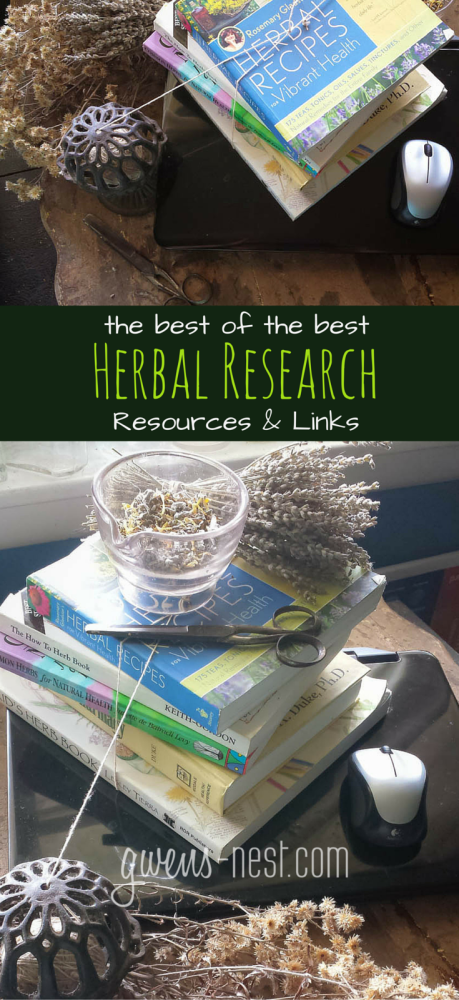
Subscribed
I was delighted to find this on Pinterest! I look forward to perusing each and every posting and source. Thanks for all the effort you’ve put into this. It maybe a labor of love, but it still represents a LOT of hours.
Absolutely, Patricia. 🙂 Lots of hours, and lots of love put in here. Thanks so much for stopping by, and I’m so glad this is helpful to you!
Oh wow you inspired me! Thanks for taking the time to put this together. I can’t wait to dig into the reading material.
Enjoy! 🙂
Have you ever looked at pacificbotanicals.com ? It’s an amazing resource for FRESH herbs. I definitely recommend checking it out especially if there are herbs you need that don’t grow in your area. 🙂 Great post btw!
This was so helpful! Thank you!